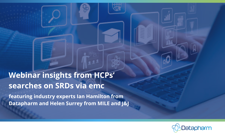Blog
9 key questions for the healthy delivery of your SRDs
Dec 20, 2024
In our latest webinar covering healthcare professionals’ (HCPs’) behaviours and SRD (Scientific Response Document) search insights, Medical Information (MI) professionals’ questions were answered by experts, Ian Hamilton (Datapharm) & Helen Surrey (MILE and J&J)

Ian Hamilton
Solutions Director in Tech, Datapharm
Datapharm and MILE recently hosted a live webinar covering insights from HCPs’ searches on SRDs via emc, featuring industry experts Ian Hamilton from Datapharm and Helen Surrey from MILE and J&J. Both speakers shared their extensive knowledge and unique perspectives, offering valuable insights into how HCPs are searching up these materials and some practical tips for the MI function.
What is the policy regarding off-label answers beyond the SPC or PIL?
The SRD solution allows off-label answers. Each company can decide if they wish to provide off-label answers or not. Essentially, it comes down to the specific company's opinion and attitude to risk - we certainly do have some companies that are comfortable providing off-label answers.

Are the SRDs provided on Rote Liste in German different from the English language SRDs on emc?
We can support both German and English language SRDs, and even both simultaneously. If your SRDs are in just one language, we direct the healthcare professional to use that language. We have companies that use both languages and some that use a combination of languages.
Can you tell if an HCP continues to search by adding other keywords if they don't get a hit from their initial search, or do they give up?
If there are no results from a search, we provide instructions to add additional keywords. Additionally, we offer a route to contact the pharmaceutical company's Medical Information service if they prefer, such as via phone, email, or website.
Do you get company-specific analytics, for example, information on the exact searches HCPs enter?
Detailed analytics are included as part of the solution. We capture all searches in reports, including the time, day, search term, whether it was successful, and if the answer was opened.
Are the tips you’ve provided in the webinar documented or listed anywhere as an easy win?
You can now find a recording of the webinar and its summary, including the best practice tips to ensure search success, via the webinar summary post.
Can the SRDs be downloaded by healthcare professionals (HCPs)? How can we prevent them from saving the response and potentially using outdated information in the future?
Answers (SRDs) are accessed via a webpage. While we do not offer a direct download or print option, most browsers do allow these actions. If an HCP prints the information, it is like traditional channels where they could print or save an email for future reference.
Could training videos be linked via the SRD search?
In theory, yes. We are interested in exploring new content types and media. If you’d like to discuss this with our team, get in touch.
Given the differences between individual company products, are there any standardised moderators to ensure that HCPs are aware of the limitations on applicability?
There are no specific moderators. However, using a common solution on an industry site provides more consistency for HCPs compared to visiting individual pharmaceutical company sites. For example, access is the same for all products, the search algorithm is the same, and the navigation is consistent. Companies can influence the success of their searches by the quantity of the content, keywords, etc.
Have companies observed a reduction in the number of incoming inquiries following the launch of SRD search in the UK?
While we do not have specific metrics on this, it is intuitive to expect a slight decrease. SRD Search offers a valuable channel for healthcare professionals who prefer online searches over traditional contact centres. Additionally, it is available 24/7/365, providing continuous access.
